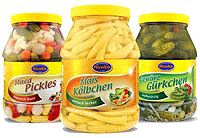Packaging
Plastic Packaging Conquers Canteen Kitchens

Friday 18. December 2009 - Ernst Nowka GmbH & Co. KG, based in Uelzen, has become one of the first German food manufacturers to announce on its website a major change from its traditional glass jars for the catering market, to a modern, highly functional plastic container manufactured at RPC Kutenholz.
The 2.4 litre Thermic Ultra multilayer jar is filled by Nowka with a number of sweet-and-sour vegetable specialities, including gherkins, pumpkins, celery and red cabbage with apples. The fine raw ingredients – most of them grown in the surrounding regions – are processed into products for the final consumer, the restaurant trade and the foodservice industry. Products are sold worldwide, with Canada, Russia, Holland, Belgium, Denmark and Spain amongst Nowkas main export countries.
The use of plastic packaging in canteen kitchens has proved its benefits for several years. Due to its low net weight and shatterproof strength it is very safe, user-friendly and highly suitable for the canteen kitchen area. The increasing importance of health and safety in foodservice environments further develops the attraction of plastic packaging formats.
The shelf life of the filled products is considerably longer due to the 6 layer structure of the extrusion blow moulded jars. By this the flexibility and retained form of polypropylene are combined with the oxygen barrier provided by the EVOH layer. Polypropylene forms a good barrier against water, is heat resistant up to approximately 121° C and is therefore suitable for most high temperature processes in food processing. EVOH has good barrier properties against oxygen but is sensitive against humidity. Therefore a PP/EVOH/PP layer structure provides the optimum combination.
These splendid barrier properties are easily combined with various possibilities of design and decoration to ensure that multi-layer plastic packaging offers effective product protection as well as excellent on-shelf appearance – thus fulfilling the high standards required by the consumer.
